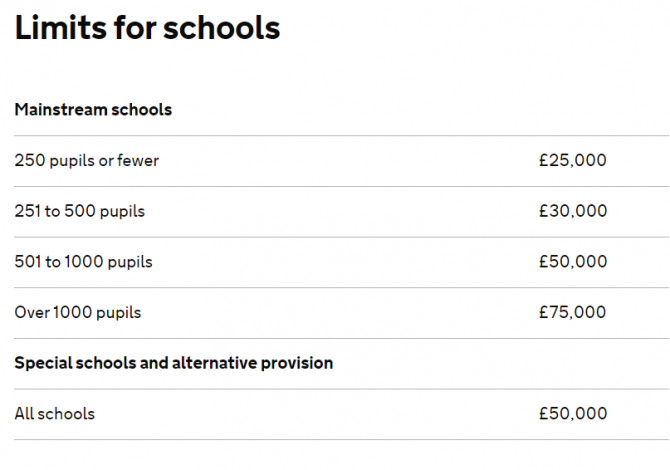Schools will only be able to claim back for extra cash spent on covering coronavirus-issues if they are unable to meet the additional costs from their existing resources.
New government guidance today has also confirmed that the level of funding paid back to schools to cover such costs will be capped at £75,000 for the largest schools, and £25,000 for the smallest (see table below).
The “mostly likely” areas where schools will face extra costs are due to increased premises-related costs, as schools are opening over holidays, support for pupils on free school meals, and additional cleaning, the guidance states.
Funding will be available to schools that are unable to meet such additional costs from existing resources
Schools that face “other, extraordinary costs to deliver appropriate support to their pupils that are not covered by this list and cannot be met by existing budgets” should contact the Department for Education.
However the guidance states the cashback will only be available to schools “unable to meet such additional costs from their existing resources, or which they could only meet by drawing down on reserves and undermining their long-term financial stability”.
“While we are not asking schools to draw on existing reserves to meet these costs, we do not expect schools to make a claim against this funding if they are anticipating that they will be able to add to their reserves in the 2020 to 2021 financial year.”
The extra cash will be paid on top of core funding in the 2020-21 year.
The amount of funding that will be reimbursed is capped at £25,000 for schools with 250 pupils or fewer, up to £75,000 for those with 1,000 or more pupils.
The advice states: “These limits have been set to ensure that few schools will be likely to exceed them, and we do not expect there to be many schools who need to spend up to these limits.
“There may be some exceptional instances where individual schools will face additional costs that are higher than these limits. In these circumstances, schools will be able to make a case for increasing the limit when they submit a claim for additional funding.”

The funding will be for “specific items” that “we judge are likely necessary to allow schools to provide appropriate support to those children who will continue to attend school under the current arrangements”.
Schools will need to “provide assurance that costs are legitimate additional costs” and should “keep records of all expenditure”, heads and business managers should sign any claims, and schools are expected to identify the income and expenditure when reporting their accounts.
Further guidance on claiming back the expenditure will be published in June. The government said they “understand the significant challenges schools are facing at present and will therefore make the process for reporting this information as simple as possible”.
Schools unable to make up-front payments to cover additional costs should “follow the normal process seeking short-term advances to support their cash flow” by contacting the ESFA if they are an academy and the local authority if they are a maintained school.
Education secretary Gavin Williamson said: “Schools across the country are going above and beyond to support children during this hugely challenging period.
“We must support them every step of the way, which is why we are making extra funding available, on top of existing budgets, to any school facing unavoidable costs incurred due to the coronavirus crisis.”
We must support schools every step of the way
However unions have flagged concern the support does not cover “loss of income which many schools earn from activities such as hiring out facilities”.
Julia Harnden, funding specialist at the Association of School and College Leaders, added: “This can be quite a significant element of their finances.
“We are concerned about the impact this will have on budgets and we are continuing to discuss with the government how this might be addressed.”
The guidance also reminds schools to continue making the necessary payments from their existing budgets. That include schools paying top-up or other funding for pupils attending alternative provision or other SEND services.
“If placements and services for the summer term have not yet been agreed, schools should fund on the basis of previous patterns of placements and commissioning.”
To “protect staff wellbeing”, schools have also been advised to run a rota system to cover holidays, allowing staff time off in lieu for this and make “appropriate use of their supply budget”.
Any schools with “unavoidable staffing costs” should discuss with their regional schools commissioner who will “support them to resolve the issue”.








Your thoughts